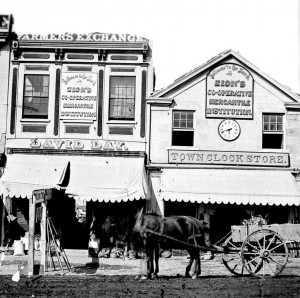In 1868, while manufacturing and retailing cooperatives were thriving in Brigham City, the LDS Church leadership wanted to expand that model throughout the Utah Territory to protect, strengthen, and unite the Saints economically, and prepare them to eventually live in United Orders.
General Conference that October focused on preparing the Saints to support a church-wide roll-out of the Brigham City model. Like Brigham City, the Church cooperative system had a central co-op store, selling locally-produced and imported goods at un-inflated prices. Each community established a co-op store as well.
 They named the central store, Zion’s Cooperative Mercantile Institute, or ZCMI. Local manufacturing co-ops were incorporated into the network and sported signs pronouncing, “Holiness to the Lord. Zion’s Cooperative Mercantile Institute”.
They named the central store, Zion’s Cooperative Mercantile Institute, or ZCMI. Local manufacturing co-ops were incorporated into the network and sported signs pronouncing, “Holiness to the Lord. Zion’s Cooperative Mercantile Institute”.
True to form, the poor Saints were given first option to buy as much stock as they could so that the dividends could be spread out among all the people. The rich among the Saints were told not to buy large quantities of stock but were directed to use their resources to launch manufacturing enterprises to benefit everyone.
 Each ZCMI store was organized more like a joint-stock company than a modern-day cooperative, but they did deserve the name because the profits went directly back into strengthening each community’s economy through dividends and the establishment of additional manufacturing cooperatives.
Each ZCMI store was organized more like a joint-stock company than a modern-day cooperative, but they did deserve the name because the profits went directly back into strengthening each community’s economy through dividends and the establishment of additional manufacturing cooperatives.
Church Historian Leonard J. Arrington reported that ZCMI and the local cooperatives used their profits to launch cooperative clothing factories, “butcher shops, blacksmith shops, dairies, carding machines, gristmills, sawmills, tanneries, boot and shoe shops, molasses mills, furniture shops” etc.
In 1869, President Young declared, “This cooperative movement is only a stepping stone to what is called the Order of Enoch….” And, nearly five years into the cooperative movement, an official letter, signed by the First Presidency and the Twelve, was circulated that proclaimed the ZCMI network of cooperatives to be a smashing success.
Unfortunately, the Church’s prosperous economic engine was largely dismantled less than twenty years later by the enforcement of the US Government’s anti-polygamy laws. The Church had to be satisfied with just being a religion and not a true theocracy with a Zion-like cooperative economy. However, D&C 58:26-28 suggests we today could follow the example of these brave economic pioneers, organize ourselves, enjoy the benefits of Cooperative Free Enterprise, and prepare ourselves to live as one.

B
August 1, 2015 @ 11:54 am
I think that if a well thought out plan were presented and explained that those prepared by the Lord might be prompted to join in. That would also be an indicator of the Lords desire this work be done. D&C 101:64–74 has some wise council.
Jesse
August 1, 2015 @ 8:16 pm
Is verse 74 saying what I think it’s saying?!
BEaton
August 17, 2015 @ 4:06 pm
I see it as instructions of how as well as another “permission.” The how is what I focus on and would hope we can organize to do it that way. But currently many may need help to spiritually and mentally get ready to act.
Joscha
September 1, 2015 @ 1:40 am
B I totally agree with you. So my question is: Do you have a plan? Or are you working on one. I would love to help.
BEaton
September 5, 2015 @ 1:20 pm
Hi Joscha,
Yes, there is a plan. It’s ‘a’ plan that has been developed in some of our heads for many years. HF seems not to want our full thoughts put forward just yet.
1st – In the short term I think (not speaking for anyone else) that the possible like-minded need to be, in a subtle manner, notified of people with similar interest gathering at this site and if they like the information invited to join “The Zion Society” on FB.
As an example I’ve sent emails with: “Some of you know of my interest in developing self-sustaining communities and developing governance and economies using principles that have been given by revelation.
Anyone interested can go to https://buildingzion.org/ . Read and study the information there. If it’s of interest to you – post that you are interested in joining ‘The Zion Society’ FB group and join in on the conversation.
We’d love to have your opinions and ideas.”
I’m becoming a member of face book groups who seem to have interest in the ‘last-days,’ sanctification, the current state of the nation or Zion. Looking for the spiritually mature who also seem to understand that something can be done.
The idea behind The Zion Society FB group, for me, is to align member’s, of like minds and hearts, into a well-organized group (council) to show the feasibility of developing and executing a plan resulting in a community that is self-sustaining and applies gospel principles, in governance, education, and economics. That does not mean that such communities are Zion. Only the Lord could declare that – but it does mean that they are seeking to become Zion.
2nd – In the mid-term One of the problems to overcome started when “We the People,” around 1913, gave up a government ‘Of, By and For the People’ (a Republic). Most people alive today no longer know how to operate as a Republic. In giving our authority to Washington DC we’ve become a Democracy which is now transitioning into an Oligarchy. For a clearer understanding see: https://www.youtube.com/watch?v=VogzExP3qhI – The American Form of Government
In my mind, when the numbers and/or the time is right, Jesse can introduce the Sociocrates decision making process. By this process people can learn how to operate in a council form of government, much like the Church does, thus developing a republican form of governing. Thereby people may feel that they helped plan and are a part of the community (ies), from the beginning, and learn how a Republic works in that process. If done correctly these communities can easily be assimilated into, or even become, the Lords Kingdom.
3rd – In the long-term Interested people and those moved upon by the HG, establish self-sufficient, self-sustain, self-governing communities. Hopefully these communities, as their members are directed by the HG, become models by which people, across the planet, can emulate and duplicate.
Such communities working together can become an alternative to Babylon. They may even become garners (a storehouse or granary) of the righteous before and during the fall and destruction of Babylon. Those who need to wait “to come out of her,” for whatever reason, until after she falls many have to live in tent cities for a while.
The house of cards, which is Babylon, began its fall long ago. What people are waking up to now, what many could not or would not see before, is the last great commotions of that collapse. Abraham Lincoln compared the US government to a ship – The Ship of State. That ship is sinking, some passengers know that it’s sinking. Others do not. I also look at these communities as life boats. The time to get into a life boat is before the ship sinks.
Caution – I am not looking for ‘a leader’ nor to become a leader in this process. I am seeking the “like-minded” to come together (D&C 88:40) and like Moses “would God that all the LORD’s people were prophets, and that the LORD would put his spirit upon them!” (Numbers 11:29). “the God of heaven set up a kingdom” “the stone was cut out of the mountain without hands” As the Lord is our leader, through and by the HG, then these communities can become as “a stone was cut out without hands” “and the stone that smote the image became a great mountain, and filled the whole earth.” (see Daniel 2:34–45)
As to your desire to help – pray to our Father in Heaven, in the name of our Lord and Savior, Jesus Christ, for His instruction to you in this work. As you are moved upon, by the HG, and start that work the rest will know of it – by the HG.
Love Always. B
Joscha
September 11, 2015 @ 4:33 am
Thank you for your Answer Brother B.
Seems like I have finally found someone that thinks like me.
I would love to join the FB group.
What do I need to do to join?
BEaton
October 7, 2015 @ 1:34 pm
Joscha, I assume that Jesse will set you up with membership in “The Zion Society” soon.
Jesse
October 8, 2015 @ 8:37 am
Wasn’t able to find Joscha on FB. I did set him up with a user account here on BZ.org weeks ago.
Joscha
October 10, 2015 @ 6:01 pm
I wrote an email saying that I don´t have Facebook, but i created an account for this under a different name.